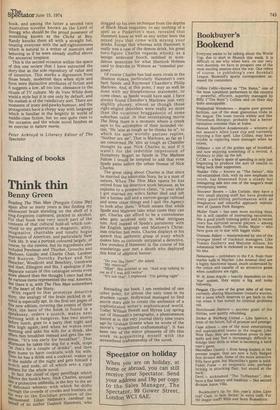Fiction
Consumer durables
Peter Ackroyd
Thirty-Four East Alfred Coppel (Macmillan £2.75) The Radish Memoirs Terence de Vere White (Gollancz £2.25).
Why is it always in the socialist utopia of totalitarianism that the horror of marketed mind-blowing instant fantasy experience drugs is placed, where sensations will be bought and sold over the counter, reality only a drug away? Even in our shadowy and mythical present the novel itself has become a down-market Librium, the consumerised product which offers instant satisfaction with a minimum of observable risk, a neat package of real life and its various thrills. The economics of this mass transquilisation have been explained to me before, and m told it has something to do with the act that libraries will buy anything. But the politics of it are another matter, and should be immediately investigated by all those who believe that the people should not be given opiates.
Two consumer durables to be released on the market this week prompted me to these pot-bellied reflections. Thirty-Four East is now appearing after an intensive publicity campaign and it has all the virtues of a new kind of chocolate — it is sickly, it is solid and it has a surprise centre. Our literate society gets, of course, the novelists it deserves and Mr Coppel has written a cautionary tale which will freeze the cockles of a million narrow hearts. It is a conventional story in which the conventions obtrude so much that they can be extracted like the bones from over-cooked cod. There is the vicarious thrill of the great: the President of the United States (last seen in an episode of Thunderbirds) is sending his Vice-President to ratify a Middle-east agreement separating Egyptian and Israeli forces along the thirty-fourth parallel. There are the creaking engines of character-conflict: the Vice-President is a dove or magpie, and treats the American army with the hauteur which only professional liberals can muster. And there is no less mechanical sex, more or less confined to fiction nowadays, as the leader of the American contingent lets it all hang out with a Jewish secretary. And then there is violence, the most elaborate rhetorical trope of our time: the Vice-President is captured by Arab guerillas on the same day as the President is killed in an air-crash. The misunderstandings which follow turn the world red with nuclear alerts and, in the best traditions of pulp culture, the hardware is switched off only just in time. The emotional soft machine chills our spinal cords and no less quickly warms them up again.
When the conventions of the common-orlibrary social novel become, in fact, the content of the narrative, there will be a little local difficulty about characterisation and style and other peripheral matters which no doubt belong to the nineteenth century when the novel was in three volumes and a good thing. Modern novelists are less corseted, of course, and they use a demotic semaphore which does credit to the speed of modern life. A character with "a drooping moustache accentuated his thin lips and strong, meaty chin" and we know immediately that he is a villain and a terrorist. The characters remain stiffly at attention and, since intention and behaviour are made absolutely certain from the beginning, there is no chance of anything going wrong. The code-language of these fictions is by now so familiar that it reaches the higher levels of abstraction: Mr Coppel can write "frigid dampness" and "lowering sky" without being any the worse for it, and a single, simple phrase can summarise with deadly accuracy human emotions which have been dragged from the depth of centuries:
"I said this morning I would come."
"That was this morning. A hundred years ago." "At least a hundred," he said. He reached for her....
and with that gesture let us steal away, a gesture frozen for more years than any novelist would care to remember.
The other product this week comes in an attractive red, yellow and white package. Its brand-name is The Radish Memoirs and it is from the fine old family firm of Terence de Vere White. There is a list of ingredients on the outside, but I am afraid that there is a great deal of colouring ("the ending is delightfully ironical") and more than a touch of artificial preservative ("wickedly funny ... vividly malicious"). It can be taken with tea or after any main meal, but I would not suggest that you try it more than three times a day, unless you care to suffer undue discomfort. There is such a thing as an excess of laxity.
The Radish Memoirs offers a smoked mirror-image within a beautiful surround, and our common aspiration should be to become what we read. The novel is a palliative as well as a laxative, exciting a gentle and safe emotion at the same time as it lifts us back into our accustomed niche. Mr de Vere White's world is that of drawing-room farce, a world in which age is calculated on the number of parties held, and death is announced by a sudden auction. Randy Radish is writing his memoirs, as small bores will do, and there are some members of society who pretend to be outraged when they are mentioned and others who are genuinely outraged when they are not. Among the former is Eleanor Hartley, a lady who has sacrificed intensity to variety and is lying to this effect somewhere in the
book, and among the latter a second rate Australian novelist known as the Laird of Smogg who should be the proud possessor of something known as the Cliche at Bay. Randy knocks them all with a straight bat, treating everyone with the self-righteousness which is natural to a writer of memoirs and behaving as if he were already stuffed above the ancestral fireplace.
This is the second occasion within the space of this one review that I have extracted the story-line as the sole repository of value and of intention. This marks a digression from those heady, modernist days when style and form were distinctive attributes of fiction and it suggests a low, all too low, obeisance to the rituals of TV culture. Mr de Vere White does wield a style but it is one only by default, and his realism is of the valedictory sort. There are moments of irony and pawky humour, and the Protagonists have a chirpy way with language which is familiar in the brightly lit world of middle-class fiction, but no one quite rises to the occasion and the whole novel finishes as an exercise in nature morte.
Peter Ackroyd is Literary Editor of The Spectator



































 Previous page
Previous page